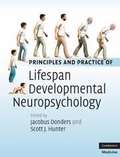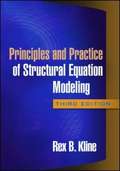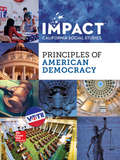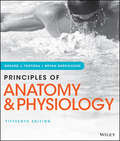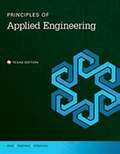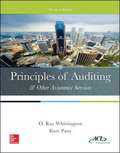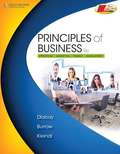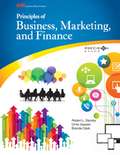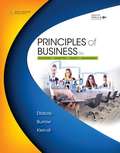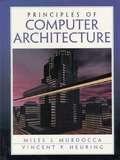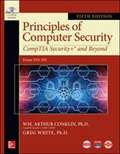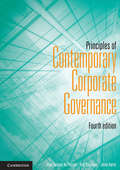- Table View
- List View
Principles and Practice of Lifespan Developmental Neuropsychology
by Jacobus Donders Scott J. HunterLifespan developmental neuropsychology is the study of the systematic behavioral, cognitive, and psychosocial changes and growth that occur across infancy, adolescence, adulthood and later life. This book provides insight into how brain-behavior relationships change over time, how disorders differ in presentation across the lifespan, and what longer-term outcomes look like. Providing practical guidance in a succinct and accessible format, this book covers the most common neurodevelopmental, behavioral and cognitive disorders, including but not limited to ADHD, cerebral palsy, traumatic brain injury, and epilepsy. Key points concerning the practice of developmental neuropsychology are emphasized in order to aid understanding of neuropsychological development and its impact on behavior, emotion, cognition, and social integration. This will be essential reading for advanced graduate students and early career professionals in the fields of neuropsychology, pediatric psychology, clinical psychology, school psychology, and rehabilitation psychology, as well as practitioners in the allied fields that interact with neuropsychology.
Principles and Practice of Marketing
by Jim BlytheWhen you think of marketing you may think of the adverts that pop up at the side of your screen or the billboards you see when you're out - all those moments in the day when somebody is trying to grab your attention and sell you something! Marketing is about advertising and communications in part, but it's also about many other things which all aim to create value for customers, from product research and innovation to after-care service and maintaining relationships. It's a rich and fascinating area of management waiting to be explored - so welcome to Marketing! <P><P> Jim Blythe's Principles and Practice of Marketing will ease you into the complexities of Marketing to help you achieve success in your studies and get the best grade. It provides plenty of engaging real-life examples, including brands you know such as Netflix and PayPal - marketing is not just about products, but services too. Marketing changes as the world changes, and this textbook is here to help, keeping you up to speed on key topics such as digital technologies, globalization and being green. <P> The companion website offers a wealth of resources for both students and lecturers and is available at www.sagepub.co.uk/blythe3e.
Principles and Practice of Structural Equation Modeling (3rd Edition)
by Rex B. KlineFor students and researchers in the social sciences who do not have an extensive quantitative background, Kline (psychology, Concordia U. , Montreal) explains the principles, assumptions, strengths, limitations and applications of structural equation modeling. His presentation therefore is conceptual rather than mathematically oriented, with few formulas and symbols and many examples in a number of disciplines. Among his topics are fundamental concepts, computer tools, identification, hypothesis testing, and mean structures and latent growth models. No dates are noted for previous editions. Annotation ©2010 Book News, Inc. , Portland, OR (booknews. com)
Principles and Practice of Veterinary Technology (3rd Edition)
by Margi SiroisPrinciples and Practice of Veterinary Technology provides comprehensive coverage of the competencies every vet tech needs to know and offers excellent preparation for clinical practice and for veterinary technician credentialing examinations. This third edition has been designed primarily for the veterinary technician student with a particular focus on providing a ready reference on the diverse information that will be needed once the student graduates and begins working in the field.
Principles and Practices of Case Management in Rehabilitation Counseling
by E. Davis Martin Jr.This second edition is a major revision and update of Rehabilitation and Disability: Psychosocial Case Studies. The role and function of the rehabilitation counselor is described relative to the principles and practices of case management in the vocational rehabilitation process. The first chapter describes landmark legislation that has ensured the human and civil rights of persons with disabilities. The author relates changes to those of the consumerism movement, as persons with disabilities move from passive recipients of services to active participants capable of steering their own future, choosing their jobs and environments. Assessment as a best practice has expanded from being agency-oriented to being person-oriented. In addition to the use of best practices, the author advocates the use of best values to serve as the decision-making foundation for the application of best practices. Values can be the standards that guide the entire rehabilitation service delivery process, including the formulation of objectives, the search for alternatives, and the choices among them. The goal is for the client to realize the American Dream. The first two parts of the text provide a person-based philosophy and a substantial knowledge base in case management, and the thirteen case studies in the third part allow the reader to investigate the use of best practices and best values in case management. An outstanding group of contributors was selected to author various chapters. Their collective achievements have included agency-executive leadership, university professorships and consultative activities at the state, national, and international levels. Each contributor, as well, has made significant scholarly contributions to the rehabilitation literature. While the text was developed primarily for use in graduate rehabilitation counseling programs, it has great utility for related academic programs in allied health, psychology, social sciences, and special education. The text, also, has practical value for in-service and short term training anywhere that the vocational rehabilitation process can be facilitated from a client-centered perspective.
Principles of Accounting, 12th Edition
by Belverd E. Needles Marian Powers Susan V. CrossonNeedles/Powers/Crosson PRINCIPLES OF ACCOUNTING is continuously evolving to meet the needs of today's learner. This edition's new structure is based on research with students about the best way to deliver content in this course! The chapters in Needles/Powers/Crosson have been organized into the Three Section Approach, which helps you more easily digest the content. The first section is Concepts and focuses on the overarching accounting concepts that require consistent reiteration throughout the course. With a clear understanding of the concepts, you are then ready to experience the second section--Accounting Applications. Here you practice the application of accounting procedures with features like "Apply It" and a new transaction analysis model, which clearly illustrates how transactions are the result of business decisions and recorded in a way to show their effects on the financial statements. Finally, you utilize section three, Business Applications. This section illustrates how the concepts and procedures are used to make business decisions. Real company examples are used throughout the chapter to show students the relevance of the material. This logical progression through the material is further supported in the online environment in CengageNOW with the Tri-Level Problem. This problem mirrors the Three Section Approach and connects the sections to facilitate a more complete understanding. These substantial changes will make you a more efficient learner and are designed to prepare you for a business world increasingly complicated by ethical issues, globalization.
Principles of Agriculture, Food, and Natural Resources: Applied Agriscience
by John S. Rayfield Kasee L. Smith Travis D. ParkNIMAC-sourced textbook
Principles of Algebraic Geometry
by Phillip Griffiths Joseph HarrisA comprehensive, self-contained treatment presenting general results of the theory. Establishes a geometric intuition and a working facility with specific geometric practices. Emphasizes applications through the study of interesting examples and the development of computational tools. Coverage ranges from analytic to geometric. Treats basic techniques and results of complex manifold theory, focusing on results applicable to projective varieties, and includes discussion of the theory of Riemann surfaces and algebraic curves, algebraic surfaces and the quadric line complex as well as special topics in complex manifolds.
Principles of American Democracy (IMPACT California Social Studies)
by Lee Arbetman Donald Ritchie Richard Remy Lena Scott Megan HansonNIMAC-sourced textbook
Principles Of Anatomy And Physiology
by Gerard J. Tortora Bryan H. DerricksonThe phenomenally successful Principles of Anatomy and Physiology continues to set the discipline standard with the 15th edition. Designed for the 2-semester anatomy and physiology course, Principles of Anatomy and Physiology combines exceptional content and outstanding visuals for a rich and comprehensive classroom experience. Enhanced for a digital delivery, the 15th edition, gives students the ability to learn and explore anatomy and physiology both inside and outside of the classroom.
Principles of Anatomy and Physiology (10th Edition)
by Gerard J. Tortora Sandra Reynolds GrabowskiAnatomy textbook. * "Clinical Application" sections demonstrate the clinical or professional significance of the discussion. * Coverage of scientific research and breakthroughs in understanding the human body keep the book on the cutting edge.
Principles of Anatomy and Physiology 14th Edition
by Gerard J. Tortora Bryan DerricksonThis 14th edition of the phenomenally successful Principles of Anatomy and Physiology continues to set the standard for the discipline. Written and superbly illustrated for two-term, introductory Anatomy and Physiology students, this text offers a rich and complete teaching and learning environment.
Principles of Animal Physiology (Second Edition)
by Christopher D. Moyes Patricia M. SchultePrinciples of Animal Physiology, Second Edition continues to set a new standard for animal physiology books with its focus on animal diversity, its clear foundation in molecular and cell biology, its concrete examples throughout, and its fully integrated coverage of the endocrine system. The book includes the most up-to-date research on animal genetics and genomics, methods and models, and offers a diverse range of vertebrate and invertebrate examples. The Cellular Basis of Animal Physiology: Introduction to Physiological Principles, Chemistry, Biochemistry, and Cell Physiology, Hormones and Cell Signaling, Neuron Structure and Function, Cellular Movement and Muscles. Integrating Physiological Systems: Sensory Systems, Functional Organization of Nervous Systems, Circulatory Systems, Respiratory Systems, Ion and Water Balance, Digestion, Locomotion, Thermal Physiology, Reproduction. MARKET: For all readers interested in animal physiology.
Principles of Applied Engineering
by Kenneth Reid David Reeping Elizabeth A. StephanNIMAC-sourced textbook
Principles of Arts, Audio/Video Technology, and Communications
by Emergent LearningNIMAC-sourced textbook
Principles Of Auditing And Other Assurance Services
by Ray O. Whittington Kurt PanyThe 20th edition of Principles of Auditing & Other Assurance Services provides a carefully balanced presentation of auditing theory and practice. Written in a clear and understandable manner, it is particularly appropriate for students who have had limited or no audit experience. The approach is to integrate auditing material with that of previous accounting financial, managerial, and systems courses.
Principles of Business
by Les R. Dlabay James L. Burrow Brad A. KleindlPRINCIPLES OF BUSINESS, Ninth Edition, provides complete instruction in business concepts and skills students need in today's competitive environment. This market-leading introductory business text offers extensive coverage in major business concepts, such as finance, marketing, operations, and management. Students gain valuable information and skills for the workplace, as well as preparation for success in competitive events, such as DECA, FBLA, and BPA.
Principles of Business
by Les R. Dlabay James L. Burrow Brad A. KleindlPRINCIPLES OF BUSINESS, Eighth Edition, prepares students for the real world of business with complete coverage of finance, marketing, operations, and management.
Principles of Business, Marketing, and Finance
by Robert L. Dansby Chris Gassen Brenda ClarkNIMAC-sourced textbook
Principles of Business, Marketing, and Finance
by Robert L. Dansby Chris Gassen Brenda ClarkPrinciples of Business, Marketing, and Finance is a contemporary text that presents the business concepts that are vitally important in today’s workplace. The basics of business, marketing, and finance are introduced in an easy-to-understand manner that helps students connect the concepts to their everyday life. By studying this text, students will learn the basic principles of commerce, which can help them become valuable employees and responsible citizens. Personal finance information is also presented to help students become knowledgeable consumers and financially literate individuals.
Principles of Business, Precision Exams Edition
by Les Dlabay James Burrow Brad KleindlNIMAC-sourced textbook
Principles of Cognitive Neuroscience, Second Edition
by Dale Purves Roberto Cabeza Scott A. Huettel Kevin S. Labar Michael L. Piatt Marty G. WoldorffWritten by seven leading authors, Principles of Cognitive Neuroscience covers the growing subject of cognitive neuroscience. Now in its second edition, the text has been streamlined for ease of reference. Fully updated and containing more effective pedagogical features, it comes with an upgraded version of Sylvius 4 Online.
Principles of Computer Architecture
by Miles J. Murdocca Vincent P. HeuringDesigned especially for undergraduates in computer-related disciplines, with emphasis to support the compiler, operating system, and networking courses. For a first course in computer architecture or computer organization. This text covers computer architecture at the instruction set architecture (ISA) and system design levels. Starting with foundation material on data representation and computer arithmetic, the book moves through the basic components of a computer architecture, covering topics at increasing levels of complexity up through CISC, network architecture, and parallel architecture. the authors have adopted the use of a SPARC-subset for an instructional ISA called "ARC" (A RISC Computer), which is carried through the mainstream of the book, and is complemented with platform-independent software tools that simulate the ARC ISA as well as the MIPS and x86 (Pentium) ISAs.
Principles of Computer Security: Comp TIA Security and Beyond
by Gregory White Chuck Cothren Roger Davis Dwayne Williams Wm. ConklinLearn IT security fundamentals while getting complete coverage of the objectives for the latest release of CompTIA Security+ certification exam SY0-501. This thoroughly revised, full-color textbook discusses communication, infrastructure, operational security, attack prevention, disaster recovery, computer forensics, and much more. Written by a pair of highly respected security educators, Principles of Computer Security: CompTIA Security+® and Beyond, Fifth Edition (Exam SY0-501) will help you pass the exam and become a CompTIA certified computer security expert.
Principles of Contemporary Corporate Governance (4th Edition)
by Jean Jacques du Plessis Anil Hargovan Jason HarrisNow in its fourth edition, Principles of Contemporary Corporate Governance offers comprehensive coverage of the key topics and emerging themes in private sector corporate governance. It explains both the principles of corporate governance systems and their real-world application in an authoritative and engaging manner. This fully revised and updated text has four parts: basic concepts, board structures and company officers; corporate governance in Australia; corporate governance in international and global contexts; and shareholder activism and business ethics. The coverage of international contexts, written by specialists, includes sections on the US, the UK, Canada, South Africa, the EU, the OECD, Germany, Japan, China and Indonesia, plus new sections on New Zealand and India. A new chapter on business ethics and corporate governance presents contemporary discussions on the topic and explores some of the broader legal issues. Principles of Contemporary Corporate Governance is an indispensable resource for business and law students studying corporate governance, and also for academic researchers and practitioners wanting a deeper understanding of its underlying principles.
